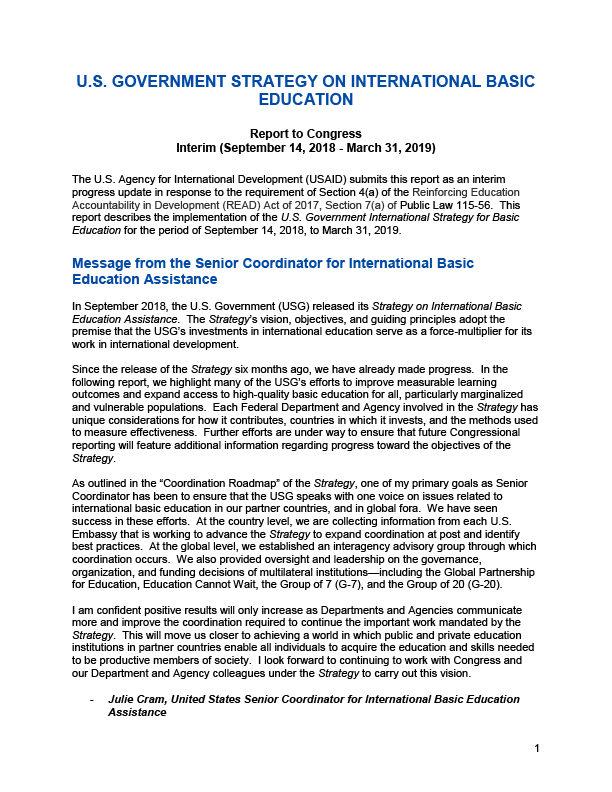Speeches Shim
Report to Congress
Interim (September 14, 2018 - March 31, 2019)
The U.S. Agency for International Development (USAID) submits this report as an interim progress update in response to the requirement of Section 4(a) of the Reinforcing Education Accountability in Development (READ) Act of 2017, Section 7(a) of Public Law 115-56. This report describes the implementation of the U.S. Government International Strategy for Basic Education for the period of September 14, 2018, to March 31, 2019.
Message from the Senior Coordinator for International Basic Education Assistance
In September 2018, the U.S. Government (USG) released its Strategy on International Basic Education Assistance. The Strategy’s vision, objectives, and guiding principles adopt the premise that the USG’s investments in international education serve as a force-multiplier for its work in international development.
Since the release of the Strategy six months ago, we have already made progress. In the following report, we highlight many of the USG’s efforts to improve measurable learning outcomes and expand access to high-quality basic education for all, particularly marginalized and vulnerable populations. Each Federal Department and Agency involved in the Strategy has unique considerations for how it contributes, countries in which it invests, and the methods used to measure effectiveness. Further efforts are under way to ensure that future Congressional reporting will feature additional information regarding progress toward the objectives of the Strategy.
As outlined in the “Coordination Roadmap” of the Strategy, one of my primary goals as Senior Coordinator has been to ensure that the USG speaks with one voice on issues related to international basic education in our partner countries, and in global fora. We have seen success in these efforts. At the country level, we are collecting information from each U.S. Embassy that is working to advance the Strategy to expand coordination at post and identify best practices. At the global level, we established an interagency advisory group through which coordination occurs. We also provided oversight and leadership on the governance, organization, and funding decisions of multilateral institutions—including the Global Partnership for Education, Education Cannot Wait, the Group of 7 (G-7), and the Group of 20 (G-20).
I am confident positive results will only increase as Departments and Agencies communicate more and improve the coordination required to continue the important work mandated by the Strategy. This will move us closer to achieving a world in which public and private education institutions in partner countries enable all individuals to acquire the education and skills needed to be productive members of society. I look forward to continuing to work with Congress and our Department and Agency colleagues under the Strategy to carry out this vision.
-Julie Cram, United States Senior Coordinator for International Basic Education Assistance


Comment
Make a general inquiry or suggest an improvement.